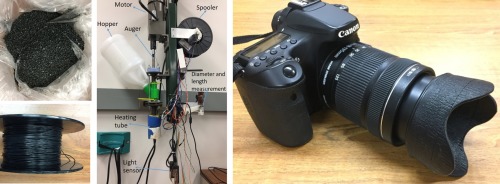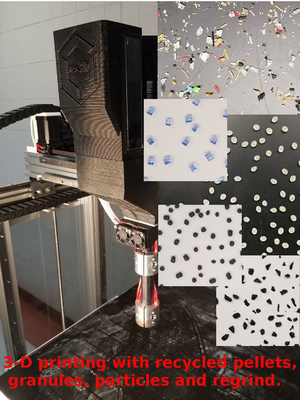J.M.Pearce (talk | contribs) mNo edit summary |
J.M.Pearce (talk | contribs) |
||
| (13 intermediate revisions by the same user not shown) | |||
| Line 4: | Line 4: | ||
==Source== | ==Source== | ||
* Shan Zhong & Joshua M. Pearce. [https://doi.org/10.1016/j.resconrec.2017.09.023 Tightening the loop on the circular economy: Coupled distributed recycling and manufacturing with recyclebot and RepRap 3-D printing],''Resources, Conservation and Recycling'' 128, (2018), pp. 48–58. doi: 10.1016/j.resconrec.2017.09.023 [ open access] | * Shan Zhong & Joshua M. Pearce. [https://doi.org/10.1016/j.resconrec.2017.09.023 Tightening the loop on the circular economy: Coupled distributed recycling and manufacturing with recyclebot and RepRap 3-D printing],''Resources, Conservation and Recycling'' 128, (2018), pp. 48–58. doi: 10.1016/j.resconrec.2017.09.023 [https://www.academia.edu/34738483/Tightening_the_Loop_on_the_Circular_Economy_Coupled_Distributed_Recycling_and_Manufacturing_with_Recyclebot_and_RepRap_3-D_Printing open access] | ||
** Full open source plans to build a [[recyclebot]] | ** Full open source plans to build a [[recyclebot]] | ||
** [[Solar powered recyclebot literature review]] | ** [[Solar powered recyclebot literature review]] | ||
| Line 11: | Line 11: | ||
** [[Hot end holder with 3 fans]] | ** [[Hot end holder with 3 fans]] | ||
** [[RecycleBot modification - automated feeder]] | ** [[RecycleBot modification - automated feeder]] | ||
==Abstract== | ==Abstract== | ||
[[image:Recycledabs.jpg]] | [[image:Recycledabs.jpg|right]] A promising method of enhancing the circular economy is distributed plastic recycling. In this study plastic waste is upcycled into 3-D printing filament with a recyclebot, which is an open source waste plastic extruder. The recyclebot is combined with an open source self-replicating rapid prototyper (RepRap) 3-D printer, to enable post-consumer ABS plastic filament from computer waste to be further upcycled into valuable consumer products pre-designed in the digital commons. The total electrical energy consumption for the combined process is monitored and an economic evaluation is completed. The coupled distributed recycling and manufacturing method for complex products reduces embodied energy by half, while reducing the cost of consumer products to pennies. This economic benefit provides an incentive for consumers to both home recycle and home manufacture, which tightens the loop on the circular economy by eliminating waste associated from transportation and retail. It is clear from the results that waste plastic can be significantly upcycled at the individual level using this commons-based approach. This tightening of the loop of the circular economy benefits the environment and sustainability as well as the economic stability of consumers/prosumers. | ||
==Keywords== | ==Keywords== | ||
[[ | [[Circular economy]]; Distributed recycling; [[Energy conservation]]; Polymer recycling; [[Sustainable development]]; [[distributed manufacturing]]; [[life cycle analysis]]; [[recycling]]; [[recyclebot]]; [[3-D printing]]; polymer filament | ||
{{MOST-recycle}} | |||
== | == In the News== | ||
* [ | * [https://www.hs.fi/tiede/art-2000005689493.html Kodin jäte voi pian muuttua leluiksi tai käyttöesineiksi – Tältä näyttää 3d-tulostuksen tulevaisuus, joka mullistaa muovin kierrättämisen] -- Helsingin Sanomat | ||
[[Category:Polymer recycling]] | [[Category:Polymer recycling]] | ||
[[Category:MOST completed projects and publications]] | [[Category:MOST completed projects and publications]] | ||
Revision as of 06:39, 5 May 2019
Source
- Shan Zhong & Joshua M. Pearce. Tightening the loop on the circular economy: Coupled distributed recycling and manufacturing with recyclebot and RepRap 3-D printing,Resources, Conservation and Recycling 128, (2018), pp. 48–58. doi: 10.1016/j.resconrec.2017.09.023 open access
Abstract

A promising method of enhancing the circular economy is distributed plastic recycling. In this study plastic waste is upcycled into 3-D printing filament with a recyclebot, which is an open source waste plastic extruder. The recyclebot is combined with an open source self-replicating rapid prototyper (RepRap) 3-D printer, to enable post-consumer ABS plastic filament from computer waste to be further upcycled into valuable consumer products pre-designed in the digital commons. The total electrical energy consumption for the combined process is monitored and an economic evaluation is completed. The coupled distributed recycling and manufacturing method for complex products reduces embodied energy by half, while reducing the cost of consumer products to pennies. This economic benefit provides an incentive for consumers to both home recycle and home manufacture, which tightens the loop on the circular economy by eliminating waste associated from transportation and retail. It is clear from the results that waste plastic can be significantly upcycled at the individual level using this commons-based approach. This tightening of the loop of the circular economy benefits the environment and sustainability as well as the economic stability of consumers/prosumers.
Keywords
Circular economy; Distributed recycling; Energy conservation; Polymer recycling; Sustainable development; distributed manufacturing; life cycle analysis; recycling; recyclebot; 3-D printing; polymer filament
See also
RepRapable Recyclebot and the Wild West of Recycling
Recycling Technology
- Recyclebot
- RepRapable Recyclebot: Open source 3-D printable extruder for converting plastic to 3-D printing filament
- Open Source 3-D Filament Diameter Sensor for Recycling, Winding and Additive Manufacturing Machines
- Improving recyclebot concepts
- 3-D Printable Polymer Pelletizer Chopper for Fused Granular Fabrication-Based Additive Manufacturing
- Mechanical Properties of Direct Waste Printing of Polylactic Acid with Universal Pellets Extruder: Comparison to Fused Filament Fabrication on Open-Source Desktop Three-Dimensional Printers
- Fused Particle Fabrication 3-D Printing: Recycled Materials' Optimization and Mechanical Properties
- Multi-material distributed recycling via material extrusion: recycled high density polyethylene and poly (ethylene terephthalate) mixture
- Mechanical Properties and Applications of Recycled Polycarbonate Particle Material Extrusion-Based Additive Manufacturing
- Wood Furniture Waste-Based Recycled 3-D Printing Filament
- Solar powered distributed customized manufacturing
- Mechanical Properties of Ultraviolet-Assisted Paste Extrusion and Postextrusion Ultraviolet-Curing of Three-Dimensional Printed Biocomposites
- Open Source Waste Plastic Granulator
- Open-Source Grinding Machine for Compression Screw Manufacturing
- Sustainability and Feasibility Assessment of Distributed E-Waste Recycling using Additive Manufacturing in a Bi-Continental Context
- Finding Ideal Parameters for Recycled Material Fused Particle Fabrication-Based 3D Printing Using an Open Source Software Implementation of Particle Swarm Optimization
- Waste Plastic Direct Extrusion Hangprinter
- Hangprinter for Large Scale Additive Manufacturing using Fused Particle Fabrication with Recycled Plastic and Continuous Feeding
Distributed Recycling LCA
- Tightening the loop on the circular economy: Coupled distributed recycling and manufacturing with recyclebot and RepRap 3-D printing
- Technical pathways for distributed recycling of polymer composites for distributed manufacturing: Windshield wiper blades
- Plastic recycling in additive manufacturing: A systematic literature review and opportunities for the circular economy
- Energy Payback Time of a Solar Photovoltaic Powered Waste Plastic Recyclebot System
- Life cycle analysis of distributed recycling of post-consumer high density polyethylene for 3-D printing filament
- Evaluation of Potential Fair Trade Standards for an Ethical 3-D Printing Filament
- Life cycle analysis of distributed polymer recycling
- Distributed recycling of post-consumer plastic waste in rural areas
- Ethical Filament Foundation
- Green Fab Lab Applications of Large-Area Waste Polymer-based Additive Manufacturing
- Systems Analysis for PET and Olefin Polymers in a Circular Economy
- Potential of distributed recycling from hybrid manufacturing of 3-D printing and injection molding of stamp sand and acrylonitrile styrene acrylate waste composite
- Towards Distributed Recycling with Additive Manufacturing of PET Flake Feedstocks
Literature Reviews

- Waste plastic extruder: literature review
- Life cycle analysis of polymer recycling literature review
- Solar powered recyclebot literature review
- Waste plastic extruder: literature review
- Life cycle analysis of polymer recycling literature review
Externals
- Economist article on U. of Washington's HDPE boat, Oprn3dp.me
- https://ultimaker.com/en/resources/52444-ocean-plastic-community-project
- Another possible solution - reusable containers [1]
- Commercial https://dyzedesign.com/pulsar-pellet-extruder/
- ---
- Cruz, F., Lanza, S., Boudaoud, H., Hoppe, S., & Camargo, M. Polymer Recycling and Additive Manufacturing in an Open Source context: Optimization of processes and methods. [2]
- Investigating Material Degradation through the Recycling of PLA in Additively Manufactured Parts
- Mohammed, M.I., Das, A., Gomez-Kervin, E., Wilson, D. and Gibson, I., EcoPrinting: Investigating the use of 100% recycled Acrylonitrile Butadiene Styrene (ABS) for Additive Manufacturing.
- Kariz, M., Sernek, M., Obućina, M. and Kuzman, M.K., 2017. Effect of wood content in FDM filament on properties of 3D printed parts. Materials Today Communications. [3]
- Kaynak, B., Spoerk, M., Shirole, A., Ziegler, W. and Sapkota, J., 2018. Polypropylene/Cellulose Composites for Material Extrusion Additive Manufacturing. Macromolecular Materials and Engineering, p.1800037. [4]
- O. Martikka et al., "Mechanical Properties of 3D-Printed Wood-Plastic Composites", Key Engineering Materials, Vol. 777, pp. 499-507, 2018 [5]
- Yang, T.C., 2018. Effect of Extrusion Temperature on the Physico-Mechanical Properties of Unidirectional Wood Fiber-Reinforced Polylactic Acid Composite (WFRPC) Components Using Fused Deposition Modeling. Polymers, 10(9), p.976. [6]
- Romani, A., Rognoli, V., & Levi, M. (2021). Design, Materials, and Extrusion-Based Additive Manufacturing in Circular Economy Contexts: From Waste to New Products. Sustainability, 13(13), 7269. https://www.mdpi.com/2071-1050/13/13/7269/pdf







